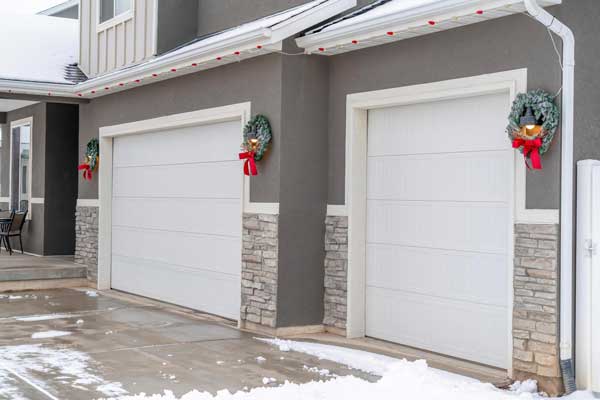Winter’s chill can affect more than just your heating bill. It can also take a toll on your garage door, which often stands as an unsung hero of your home. Being vigilant about your garage door during cold months can save you from unexpected repairs and inconvenience. Understanding how winter weather impacts your garage door is crucial for maintaining its functionality and longevity.
Effects of Cold Temperatures
Cold weather can cause the metal components in your garage door to contract. This contraction may lead to misalignment or even snapping if the metal becomes too brittle. Furthermore, the door’s springs, which bear the weight of the door, can become less effective, making it harder for the door to open and close smoothly. Regular inspections for signs of wear and tear are necessary to prevent sudden malfunctions.
Impact of Snow and Ice
Snow and ice accumulation around your garage door can obstruct its movement. Ice buildup can cause your garage door to stick to the ground, placing extra strain on the opener when you attempt to lift it. The increased force required can damage the opener or strip its gears over time. To avoid this, ensure that the area around your garage door remains free from snow and ice.
Moisture and Seal Damage
Winter weather can also damage the seals of your garage door. Moisture from snow and rain can seep into the seals, causing them to freeze and crack. Damaged seals not only allow cold air to enter your garage but also increase your utility bills as your home loses heat. Regularly check the seals and replace them if you notice any damage to maintain energy efficiency.
Lubrication Is Key
In winter, the lubricant on your garage door’s moving parts can thicken, causing extra friction and making the door harder to operate. Use a high-quality lubricant designed for cold temperatures to keep parts like rollers, springs, and hinges moving smoothly. Proper lubrication not only prevents wear and tear but also helps ensure your garage door operates quietly.
Garage Door Opener Sensitivity
Your garage door opener’s sensitivity settings might need adjustment during winter. Cold weather can cause the garage door to become heavier, affecting the settings that control the door’s opening and closing. If you notice your door struggling to operate, consider adjusting the opener’s sensitivity settings to accommodate the extra weight.
Weatherproofing Your Garage
Weatherproofing your garage door adds an extra layer of protection against winter’s harsh elements. Adding insulation helps maintain a consistent temperature, reducing strain on the door and opener. Consider installing a weather seal at the bottom of your door to prevent drafts and moisture from entering the garage.
Testing Safety Features
Cold weather can also impact your garage door’s safety features. Extreme temperatures can affect the wiring and sensors, leading to malfunctions or inaccuracies in detecting obstacles. It’s essential to get the safety features tested regularly to ensure they are functioning correctly, keeping you and your family safe.
Importance of Regular Maintenance
Winter is an ideal time to schedule garage door maintenance. A professional service can identify and address potential issues before they turn into costly repairs. Regular maintenance ensures that all components are functioning correctly, extending the lifespan of your garage door system.
Winter weather can significantly impact your garage door’s performance and longevity. By staying vigilant and addressing issues promptly, you can ensure that your garage door continues to serve you well throughout the colder months. Remember, proactive care now can save you from costly repairs later.
For expert garage door service, contact us at Raynor Door Company. We’ll help keep your door in top condition.


